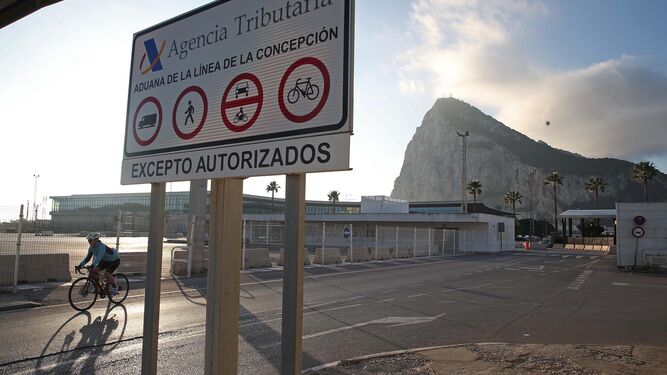
The recent agreement on Northern Ireland, the main stumbling block in the post-Brexit relationship between the EU and the UK, now puts the spotlight on the negotiations for Gibraltar's place in the EU, which, three years later, have yet to reach a conclusion.
The discretion and secrecy surrounding these negotiations only increase the uncertainty in which, above all, the more than 32,000 Gibraltarians, the more than 270,000 residents of the Campo de Gibraltar, the 15,000 cross-border workers who cross the border every day and the swarm of companies that interact on both sides of the small customs post live.
The future relationship between the EU and the Rock is not included in the trade deal that London and Brussels reached on Christmas Eve 2020, so a separate agreement is needed that requires Spain's approval.
"Everyone is playing their cards close to their chest," George Dyke, a representative of the Gibraltar Chamber of Commerce and current president of the Cross-Border Group, which brings together employers and trade unions from both sides and which is still awaiting the agreement, told EFE.
Dyke, like Ángel Serrano, regional secretary of the UGT and vice-president of the group, and many others in the area believe that the mere fact that contacts and negotiations are continuing is a sign that an agreement is still possible.
They are even optimistic about the secrecy with which the negotiations are being conducted, with no details emerging of where the obstacles are to the "New Year's Eve Agreement", which was reached on 31 December 2020, one day before the end of the transitional period of the UK's withdrawal from the EU, materialising.
Amid such secrecy, every political statement is scrutinised for clues as to the state of the negotiation that will mark the future of relations.
Last Monday, the day an agreement was reached on Northern Ireland, the Spanish Minister of Foreign Affairs, European Union and Cooperation, José Manuel Albares, said "I think we are very close to an agreement".
A few days earlier, the UK ambassador to Spain, Hugh Elliott, said that although "a lot of progress" had been made in the negotiations, there were still "thorny issues" on the table.
On 14 December, the UK minister, James Cleverly, travelled to Madrid to meet with Albares, but after the meeting, they only made public their good intentions to move forward "as quickly as possible" to reach an agreement.
Albares recalled that Spain and the EU have presented a "global proposal" that involves the disappearance of the Gibraltar fence, joint use of the airport, measures in favour of cross-border workers and the equalisation of pensions for Spaniards who have worked on the Rock, among others.
In that appearance, the British minister responded that "if the proposal were acceptable, we would have accepted it by now, but we have to fine-tune the proposal because there are some details and differences", and he called for "a fluid dialogue" to "see how to overcome these stumbling blocks".
Integration
One of these stumbling blocks is who will carry out border controls. The New Year's Eve agreement opted for Gibraltar to be integrated into the Schengen area (to which the UK does not belong) under the umbrella of Spain, which does belong.
This would allow for the elimination of the fence and for border controls for entry into the Schengen area to be at Gibraltar's port and airport. Spain believes that this control should be carried out by the Spanish security forces, with the initial support of Frontex, something Gibraltar finds difficult to accept.
Be that as it may, the "commas" of the Gibraltar agreement that the Secretary of State for the European Union, Pascual Ignacio Navarro Ríos, said back in November were still missing before it could be signed have not been resolved. Gibraltar's chief minister, Fabian Picardo, has also left room for optimism in his latest public statements on the matter: "Thousands of meetings, calls and briefings later, we may be on the verge of achieving a treaty that gives us the opportunity to put Brexit behind us".